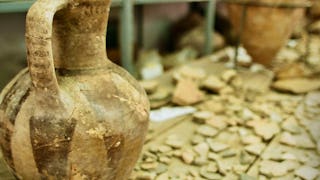With its walls razed to ground by Babylon’s armies, Jerusalem joined a long line of ancient vanquished cities—from Ur and Nineveh and Persepolis to Babylon itself. While some recovered from the destruction, others did not. But none responded to political catastrophe by fashioning the kind of elaborate and enduring monument to their own downfall that we find in the Bible. Most conquered populations viewed their subjugation as a source of shame. They consigned it to oblivion, opting instead to extol the golden ages of the past. The biblical authors in contrast reacted to loss by composing extensive writings that acknowledge collective failure, reflect deeply upon its causes, and discover thereby a ground for collective hope.

Enjoy unlimited growth with a year of Coursera Plus for $199 (regularly $399). Save now.

The Bible's Prehistory, Purpose, and Political Future

Instructor: Dr. Jacob L. Wright
30,423 already enrolled
Included with
(290 reviews)
Skills you'll gain
Details to know

Add to your LinkedIn profile
6 assignments
See how employees at top companies are mastering in-demand skills

There are 6 modules in this course
Our larger goal is to understand why the Bible was written. So first we need to take a step back and form a larger view of the world in which the kingdoms of Israel and Judah emerged. This module sets the stage for all that follows. Upon completion of this module, learners will be able to: 1) Describe how Israel's geographical location, situated between two great civilizational centers, had a decisive impact on history, 2) Identify why Egypt was interested in Canaan (the land of the Bible), 3) Describe the context in which the oldest references to Israel and places in the land of Israel appear, and 4) Analyze how the withdrawal of Egyptian influence from Canaan made it possible for territorial states (such as Israel and Judah) to emerge in the first millennium BCE.
What's included
10 videos9 readings1 assignment2 discussion prompts
In the last module, we studied the activity of the great cultures of Egypt and Mesopotamia in the Levant. These major groups played a key role in forming the backdrop for the rise of Israel and Judah. After Egyptian and Mesopotamian rulers withdrew from the area, they left breathing room for smaller groups—such as Israel and Judah—to grow and extend their own power. In this module, we will explore the more modest cultures of Israel and Judah, from the rise and fall of their respective kingdoms. Upon completion of this module, learners will be able to: 1) Differentiate between the kingdoms of Israel and Judah, and describe the circumstances that led to the rise of both, 2) Identify key figures and causes in the downfall of Israel and Judah, respectively, and 3) Analyze how the biblical authors take creative liberties in their portrayal of historical events pertaining to Israel and Judah.
What's included
15 videos3 readings1 assignment3 discussion prompts
In this module, we dive into the question of why the biblical authors created the Bible. We begin by looking at various depictions of how Judahites were living after the fall of Judah. These depictions provide us with insight into what the biblical authors were facing after the Assyrian and Babylonian conquests. We then turn our attention to the biblical writings as we deconstruct and reconstruct the text in order to discover what drives the biblical project. By engaging the text critically, we begin to see how the biblical authors creatively combined sources to create a pan-Israelite history. Upon completion of this module, learners will be able to: 1) Differentiate between extrabiblical and biblical depictions of Judahite communities living in various locations after the fall of Judah, 2) Identify distinct traditions or sources within the biblical text and distinguish between core narratives and supplements or links, and 3) Compare and contrast the dominant theories concerned with the composition of the Bible.
What's included
15 videos6 readings1 assignment3 discussion prompts
In this module, we will begin by exploring a clue that adds further support to the general thesis of this course (i.e., that the Bible is a project of peoplehood in response to the defeat of the state). That clue is the absence of martyrdom and glorious death in the biblical narratives. We will see how the biblical authors reshape their history as they fashion narratives and law codes that promote “name-making” through procreation rather than heroic death. Through values that we take for granted today, the authors work to ensure the preservation of their people under conditions of foreign rule. Upon completion of this module, learners will be able to: 1) Identify narrative texts and law codes that relate to procreation, heroic death, and the expanded roles for both men and women, 2) Differentiate between the ideals of heroism found in the Bible and those found in non-biblical text, and 3) Understand that these values emerge out of pragmatic concerns related to corporate survival and the formation of a new kind of political community.
What's included
12 videos2 readings1 assignment3 discussion prompts
As in most ancient societies, knowledge and education are reserved for elites. (The situation is not so different today.) This week we will see how the biblical authors depart radically from this principle. The Bible can be understood, Dr. Wright will suggest, as an educational curriculum for the nation. It fosters a broad national consciousness and mobilizes a people after the defeat of the state.Closely related to the Bible’s educational ideals, we will learn how the biblical authors promote a principle of “open access.” They make divine knowledge, rules, regulations publicly available so that the people as a whole can hold in check the power of their leaders. Upon completion of this module, learners will be able to: 1) Identify the distinctive qualities of biblical prophetic and priestly literature, 2) Explain how the Bible may be understood as an educational curriculum for the people as a whole, and 3) Compare the Bible to other pedagogical reforms.
What's included
13 videos2 readings1 assignment3 discussion prompts
This week, to wrap up our course, we turn back to the question of why with which we began. Why did the Bible originate in ancient Israel and Judah? We will begin by synthesizing what we’ve learned so far in order to bring it to bear on this fundamental question. Thereafter we will examine the most fascinating means by which the biblical authors reshape Israel’s identity. These means include matters that relate to theology, the covenant, and covenantal ethics. We will conclude the course by raising the question of what role the Bible may have to play in our futures. Upon completion of this module, learners will be able to: 1) Answer the question of why the Bible emerged in Israel and Judah rather than in other societies of the ancient Near East, 2) Identify the distinct theological means by which the biblical authors reshape the identity of Israel in their grand project of peoplehood, 3) Discuss the future possibilities of "biblical" projects and of the Bible itself.
What's included
15 videos2 readings1 assignment2 discussion prompts
Instructor

Offered by
Explore more from History
 Status: Preview
Status: PreviewHebrew University of Jerusalem
 Status: Preview
Status: PreviewThe University of Notre Dame
 Status: Preview
Status: PreviewTel Aviv University
Why people choose Coursera for their career




Learner reviews
290 reviews
- 5 stars
81.03%
- 4 stars
12.41%
- 3 stars
3.44%
- 2 stars
1.37%
- 1 star
1.72%
Showing 3 of 290
Reviewed on Jun 25, 2022
Excellent course. Professor Wright integrated alot of material. The discussions with other professors were an amazing reference point, and uniquely valuable when reflecting on the course.
Reviewed on Oct 11, 2016
It's a very good course if you want to know how the bible came into being, events that happened from the very beginning and how the bible continues to remain and be read even today. Wonderful!
Reviewed on Apr 29, 2021
This is a fascinating course. I needed an approach to the Bible and this was key. Of all the interviews I like Prof. O'Connor's the best. She's a fabulous teacher.

Open new doors with Coursera Plus
Unlimited access to 10,000+ world-class courses, hands-on projects, and job-ready certificate programs - all included in your subscription
Advance your career with an online degree
Earn a degree from world-class universities - 100% online
Join over 3,400 global companies that choose Coursera for Business
Upskill your employees to excel in the digital economy
Frequently asked questions
To access the course materials, assignments and to earn a Certificate, you will need to purchase the Certificate experience when you enroll in a course. You can try a Free Trial instead, or apply for Financial Aid. The course may offer 'Full Course, No Certificate' instead. This option lets you see all course materials, submit required assessments, and get a final grade. This also means that you will not be able to purchase a Certificate experience.
When you purchase a Certificate you get access to all course materials, including graded assignments. Upon completing the course, your electronic Certificate will be added to your Accomplishments page - from there, you can print your Certificate or add it to your LinkedIn profile.
Yes. In select learning programs, you can apply for financial aid or a scholarship if you can’t afford the enrollment fee. If fin aid or scholarship is available for your learning program selection, you’ll find a link to apply on the description page.
More questions
Financial aid available,


